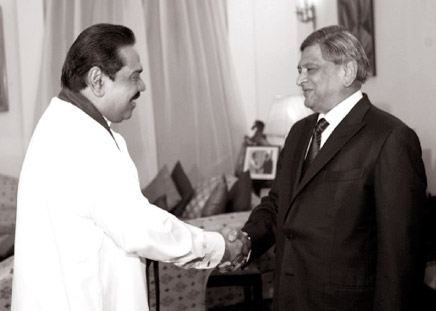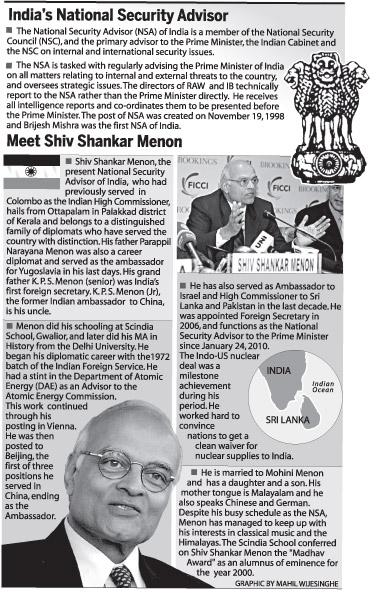|
Menon says ready to help, but won’t interfere:
India calls for home-grown solution for Sri Lanka
No room for terror outfits to use Indian soil:
By Dinesh Weerawansa in India
|

President Mahinda Rajapaksa with India’s Minister of External
Affairs S.M. Krishna during the latter’s visit to Sri Lanka
recently.
|
India’s National Security Adviser (NSA), Shiv Shankar Menon said that
Sri Lanka should have its own home-grown solutions for the problems of
its people in the North and the East and that other parties elsewhere
including in Tamil Nadu should not worry if those people are happy.
In an exclusive meeting with a high-profile team of media heads from
Sri Lanka at his office at the Ministry of Defence in New Delhi, Menon
said India would never meddle with Sri Lanka’s internal matters and it
is up to Sri Lanka to decide on the best solution to meet the
aspirations of its people.
Following are excerpts from the meeting Sri Lanka’s media heads,
including chief editors of national newspapers, had with the defence
expert of the world’s largest democracy.
Q: How do you view the role played by the media to strengthen
Indo-Lanka relations?
A: The media has a huge effect on Indo-Lanka relations. For
us, Sri Lanka is a very important partner. We just can’t do it by
ourselves. The media of both countries have an important role to play to
strengthen bilateral relations.
Q: How important is Sri Lanka to India as a neighbouring
country?
A: Sri Lanka is a very close neighbour. The Colombo Port is
very important to India. Our security is inter connected, we have
relations based not just ethnicity but on religious and other social
aspects as well.
We are in a world in which nobody could live alone. We can’t progress
unless we work together. India and Sri Lanka are very close neighbouring
countries. But when the bilateral relations are closer, there could be
complicated issues.
But we have dealt with more difficult and serious issues. It has not
been easy, but we have managed to face those successfully, respecting
each others’ interests. The economies of Sri Lanka and India too are
inter-dependent because of our intimacy.
Q: Sri Lanka has eradicated the terror which ruined the
country for three decades. How do you view the aspirations of the people
in the North and solutions for their problems?
A: When it comes to the situation in the North too, we are
ready to help Sri Lanka. But the decisions should be made by Sri Lanka.
We could help in whatever decisions taken by Sri Lanka without trying to
meddle in the internal affairs of your country. We could handle our
affairs ourselves.
It is Sri Lanka which will have to decide whether it would like to
focus on the 13th Amendment or not. India will not force anything to
that effect as we strongly believe that it should come from Sri Lanka.
We are not going to tell Sri Lanka that the solution should be this type
or that type.
Q: Let us know India’s position on this.
A: We believe that Sri Lanka should have its own home-grown
solution for its problems. Once the decision is made and if Sri Lanka
seeks whatever assistance from India, we are glad to help. I don’t see
legal solutions to political problems or vice versa.
No interference
Everybody should understand that India is not one of the actors in
this episode. Some say India should help Sri Lanka to find a solution.
At the same time, others say India should not interfere and should let
Sri Lanka make its own decision.
 It is not the Prime Minister of India who advocated implementing the
13th Amendment. India, as a friendly neighbouring country, will offer
its own views, but will not push for anything. It is not the Indian
solution that would work, but Sri Lanka’s own. It is not the Prime Minister of India who advocated implementing the
13th Amendment. India, as a friendly neighbouring country, will offer
its own views, but will not push for anything. It is not the Indian
solution that would work, but Sri Lanka’s own.
Solutions to a Sri Lankan problem should also be Sri Lankan. You
could take examples from here and there in finding a solution. Sri
Lanka, if it so wishes, could even seek India’s assistance and views.
But as I have said before, the final decision should come from Sri Lanka
and more importantly from a united Sri Lanka.
Q: Terrorism has affected other countries in South Asia too.
Is that India’s views on the situation in Sri Lanka and the concerns of
the Tamil Nadu State?
A: India has always rejected terrorism. For the last 30 years,
no mainstream Indian political party supported the LTTE.
Tamil Nadu is one of the fastest growing States in India. People in
Tamil Nadu could have their own sentiments on the people living in Sri
Lanka’s Northern Province. They were concerned in the past. There had
been misunderstandings. But all those are past.
The Indian soil will never be allowed to be used for terror acts.
India has been very firm on that and would assure no room for terrorism.
Q: The Tamil Diaspora seems to be still optimistic about the
ideas mooted by the now defunct LTTE?
A: The Tamil Diaspora has its own memories. But it’s different
to what exactly takes place back home. The important thing is what is
done at home. The key is at home. If that is right, I don’t think the
views of either the Tamil Nadu or Tamil Diaspora are important. If the
people in Sri Lanka are happy with the solution they get, why should the
people in Tamil Nadu worry about it?
Q: What is the biggest challenge you came across in your
career?
A: When we signed the Free Trade Agreement (FTA), people in
both India and Sri Lanka panicked as they made limited calculations
without looking at the broader aspects of the agreement. Nobody thought
that Sri Lanka’s exports would grow by eight times as a result of the
FTA. The other challenge is the security situation. It is not easy to
give a 24-hour guarantee.
Q: Apart from Sri Lanka, Pakistan too has been India’s
neighbouring country. How do you see the development of Indo-Pakistan
relations?
A: We would like to have good and greater relations with
Pakistan. We are always ready to go that extra mile to achieve that.
India is a democracy and whatever we do should be supported by the
people. We need a peaceful territory.
Q: What do you think about the insurgency movement in India?
A: Do you mean the naxalite movement in India? That is not a
big threat at all.
But its development is the test. We must make sure that the blueprint
of development should go to the people. In terms of violence and
geographical area, there are lesser numbers. We cannot solve these
purely by the application of force. We are learning as we work.
Q: China has been emerging as one of the fastest growing
economies in the world. How do you look at China and its relations with
India?
A: We have relations with China as well as with the other
countries who are our neighbours. As we develop, we have to learn to
live with each other.
China is India’s largest trading partner in terms of goods. We may
not have identical views on each and everything, but we both are working
closely to have a better understanding.
Q: What is India’s role in assisting Sri Lanka in its
development efforts?
A: India has offered to help Sri Lanka in the fields of
agriculture and information technology. India is assisting Sri Lanka to
build railroads, thereby helping to revive its economy. The resumption
of ferry services between Rameshwaran and Thalaimannar is a big boost.
Sri Lanka is benefited by many grants, aid and financial assistance from
India. Sri Lanka is one of the biggest beneficiaries with regard to
Indian aid, to the tune of US 1.7 billion.
India’s role
Q:Is India happy with the role it played in Sri Lanka’s battle
against terrorism?
A: Sri Lanka set an example and accomplished a successful
mission in eradicating terrorism. Everybody played a part.
Q: How do you view the increasing problems and encounters
amongst fishermen from the two countries?
A: I am happy that the fishermen of both countries have now
come to an understanding. There could be boundaries, but it is better if
we have a proper system. Then we know what’s going on. We need to sit
and discuss the issues of fishermen of both countries.
In the first stage, let the fishermen discuss among themselves. All
fishing vessels are registered and together, we could come out with a
system to determine who fishes legitimately and who is not.
Naturally, the fishermen are interested in having a larger catch.
Hence, the ultimate decision should be taken by the Governments of the
two countries. We need to work out a common mechanism. It makes sense if
the Sri Lanka Navy and the Indian coast guards work together to stop
illegal fishing, stopping other fishing vessels entering our waters.
Q: The LTTE has been destroyed and terrorism has been
eradicated by the Security Forces of Sri Lanka. Do you feel that there
is still room for a resurrection of the now defunct terror outfit?
A: It all depends on what action Sri Lanka takes. Even if the
LTTE re-emerges, it would come, not from any other side, but within Sri
Lanka.
It is up to Sri Lanka to leave no room for such a comeback. But the
Indian soil will never be allowed to be used for any terror outfit. |

